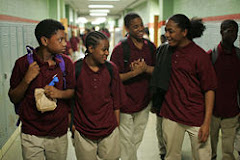One of the things that is freaking me out a bit - with now less than a month before teachers report back to school, and with nary a day off until then - is the lack of a curriculum for our IB English III course. The fault is our own; we wanted to change it up a bit, and said we'd read a bunch this summer and email each other, but both of use have been too busy to do it.
Two of us teach the course, and we have to decide the texts together. There are two sections to the Junior year - World Literature and School's Free Choice. For the former section, we have to choose three works from a long (very long) list of books in translation. For the latter section, we pretty much have free reign.
Two years ago, my picks (alone, as I was the only teacher) for the World Literature part were The Sorrow of War by Bao Ninh (translated from Vietnamese), The House of the Spirits by Isabel Allende (translated from Spanish, from Chile), and Death and the Maiden by Ariel Dorfman (translated from Spanish, from Chile). This year, we stuck with Allende's text, and added Haruki Murakami's The Elephant Vanishes (translated from Japanese) and Manuel Puig's Kiss of the Spider Woman (translated from Spanish, from Argentina).
In 2006-2007, I chose Capote's In Cold Blood, Shelley's Frankenstein, Murakami's The Elephant Vanishes, and Morrison's Song of Solomon as my Free-Choice Books. I wanted a non-fiction piece in there (Capote), a 19th century piece (Shelley), a late 20th century great American novel (Morrison), and another translated text (a requirement, actually, and it was Murakami).
In 2007-2008, we chose Shelley's Frankenstein, Morrison's Song of Solomon, Pamuk's The White Castle (the aforementioned translation requirement), and Shakespeare's Othello as our "Free Choice" texts.
So, what do we want to do this year? I'm not sure. We've decided on two texts: The White Boy Shuffle by Paul Beatty, the most daring piece of literature I've ever attempted teaching, and The Wind Up Bird Chronicle by Haruki Murakami, which just extends the highly successful Murakami short stories that we've taught at our school for years.
I think Beatty will replace Morrison (Song of Solomon is one of my all-time favorites, but I don't want to get sick of it by teaching it every single year, and just think the kids will really respond to Beatty) and Murakami's novel will replace his short story collection. Otherwise, I don't know much else.
If it were up to me, I think this is what I would do:
Part I: The Wind Up Bird Chronicle, The House of the Spirits, and then a short work, like The Metamorphosis or Death and the Maiden.
Part IV: The White Boy Shuffle, King Lear, Love in the Time of Cholera or Hundred Years of Solitutde (Marquez), and Frankenstein
I think my cohort prefers Othello to Lear, but the more I think about Othello, the less I'm into it. I just find the title character to be too easily manipulated, and Iago's racist language doesn't ever get rectified at the end. I mean, I think it's a more troubling portrayal of a black character than, perhaps, Jim in Huck Finn. Not that I shy away from negative portrayals of race, they sometimes create interesting discussions, but the person I'm discussing this with is a big anti-Huck Finn kind of person, so I'm especially interested in this issue. My primarily African-American students were definitely uncomfortable with all that animal diction used to describe Othello, in ways that I didn't notice about the use of the N-Word in Huck or other texts we've read; I think it's because the kids are desensitized to that word a bit, and probably weren't expecting similar language from Shakespeare.
Another anti-Othello note is that our curriculum is already pretty male (I wish I could find another really good female World Lit text), and Othello's lack of strong female characters is pretty appalling, especially when compared to Lear.
My cohort loves Marquez, and I'd love to give him a shot. She's kind of over Frankenstein, and I'll let her talk me out of that, as long as we get at least something in there 19th century (though I do love Frankenstein, and the kids like it too).
Oh, and the summer reading was Lahiri's The Namesake and Foster's How to Read Literature Like a Professor.
It will be interesting to see what we come up with. This was her email to me today, from England: "don't worry about the curriculum. it always, always gets done. we should probably just try to start with something familiar to the two of us. i'm giving you creative liberty. run with it!"
I think I'm going to take her up on that.
Our goals for the World Literature section generally are to provide exposure to three different cultures, and/or, provide interesting comparisons and contrasts. Students must write an original Link Paper connecting two of the works as their major assessment for IB, so this is also a factor.
Resep Masakan
11 years ago

No comments:
Post a Comment